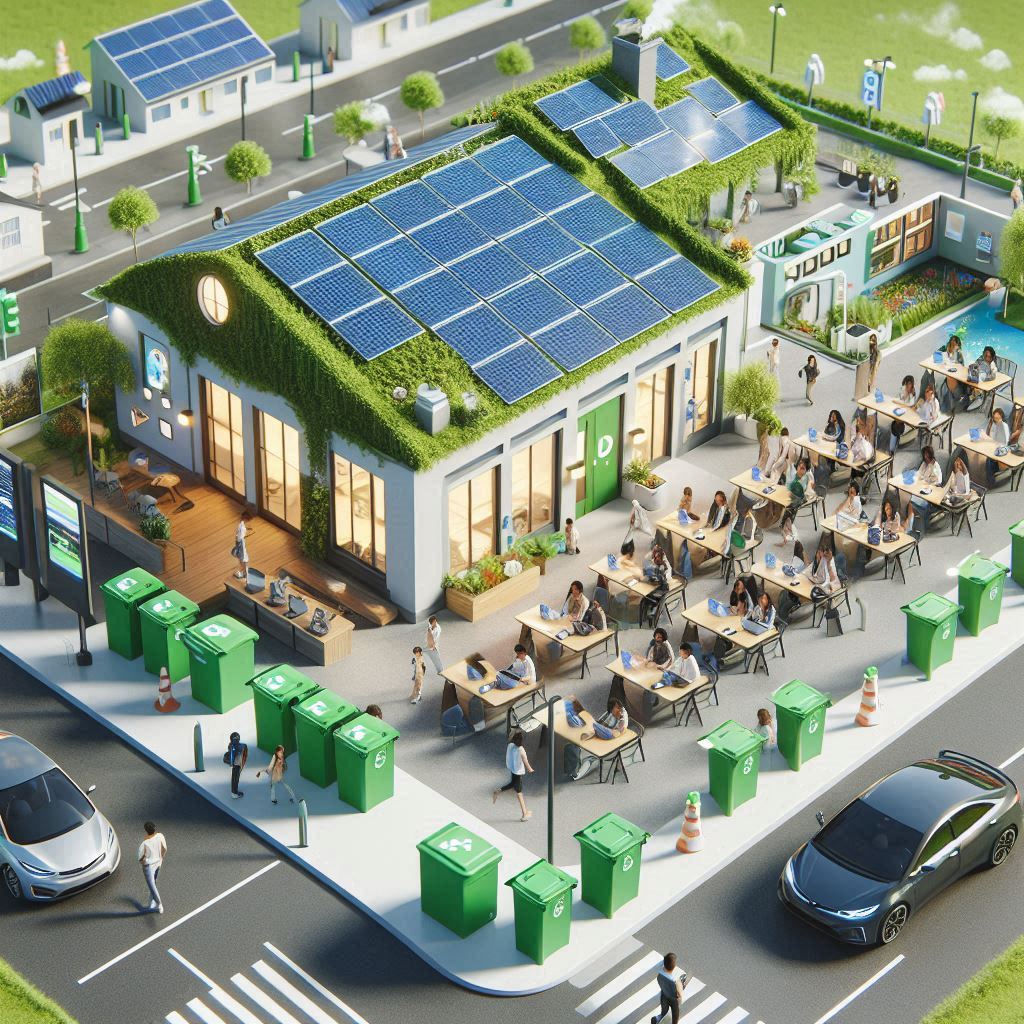The transformation of academic institutions into virtual campuses represents a significant shift towards sustainable education. This evolution is not just about transferring physical classrooms into online spaces; it’s about rethinking and redesigning the entire educational ecosystem to minimize environmental impact while maximizing learning outcomes. When you reduce the need for physical infrastructure and daily commutes, virtual campuses make a considerable contribution to lowering carbon footprints, a critical aspect of combating climate change.
Digital Green Initiatives
 Universities are championing digital green initiatives by incorporating eco-friendly practices into their virtual campuses. These strategies extend beyond simple paper-saving efforts, aiming to instill a deep-rooted sense of environmental responsibility among students, faculty, and staff. Through various digital platforms, universities are introducing innovative solutions designed to promote sustainability.
Universities are championing digital green initiatives by incorporating eco-friendly practices into their virtual campuses. These strategies extend beyond simple paper-saving efforts, aiming to instill a deep-rooted sense of environmental responsibility among students, faculty, and staff. Through various digital platforms, universities are introducing innovative solutions designed to promote sustainability.
Organizing sustainable virtual events stands out as one of the most impactful measures in promoting environmental responsibility. These online gatherings, spanning from webinars to conferences and workshops, offer a significant reduction in environmental costs typically associated with travel and physical venue arrangements. By utilizing video conferencing tools and virtual event platforms, universities can host large-scale events without leaving a carbon footprint. These initiatives not only showcase the institution’s dedication to sustainability but also provide accessible and inclusive opportunities for global participation.
Gamification has emerged as an effective tool in promoting eco-friendly habits among the virtual campus community. Universities are developing and utilizing games and online challenges that simulate real-world sustainability issues, providing students with a dynamic and interactive platform to engage with environmental subjects. These virtual experiences encourage students to adopt more sustainable lifestyles by rewarding eco-conscious behaviors with points, badges, or other incentives, effectively turning learning into action.
Virtual Campus Sustainability: A Holistic Approach
For a virtual campus sustainability initiative to be successful, it requires a comprehensive approach that encompasses all facets of the digital experience. From the digital tools and platforms used for teaching and communication to the management of virtual resources, every aspect needs to be evaluated and optimized for minimal environmental impact.
Reducing Energy Consumption
A key focus area is the reduction of energy consumption associated with digital learning. Universities are exploring energy-efficient software solutions and encouraging the use of eco-friendly devices among the campus community. This includes promoting practices such as shutting down computers when not in use and utilizing cloud-based applications that require less processing power.
Sustainable Digital Content Management
Another critical element is sustainable digital content management. With adopting eco-conscious data storage solutions and optimizing digital content for efficiency, universities can significantly reduce their digital carbon footprint. This approach leads to more streamlined and accessible learning materials for students.
The Role of Policy and Collaboration in Virtual Campus Sustainability
Achieving sustainable practices in virtual campuses requires more than just good intentions; it necessitates the backing of robust policies and a collaborative culture. Universities are increasingly recognizing the importance of developing comprehensive sustainability policies that encompass various facets of their virtual campuses. These policies serve as guiding frameworks, directing efforts to resource efficiency, waste reduction, and responsible digital consumption.
In tandem with policy development, fostering a culture of collaboration is paramount. Such collaboration should extend across departments, involving faculty, staff, and students alike. By pooling expertise and resources, the academic community can collectively identify best practices, devise innovative solutions, and pursue common sustainability objectives. This collaborative spirit not only amplifies the impact of sustainability initiatives but also nurtures a shared sense of responsibility and dedication.
Policies play a crucial role in institutionalizing sustainable practices within virtual campuses. They set clear expectations and standards, providing a roadmap for integrating sustainability into everyday operations. For instance, policies may outline guidelines for energy-efficient IT infrastructure, procurement of eco-friendly technologies, or measures to promote digital literacy and responsible online behavior.
Effective policies are dynamic, evolving alongside technological advancements and emerging sustainability challenges. They should be regularly reviewed and updated to ensure relevance and effectiveness. Policies must be accompanied by mechanisms for monitoring, evaluation, and enforcement to uphold compliance and drive continuous improvement.
Engaging the Wider Community in Sustainability Efforts
Beyond the confines of the virtual campus, universities are also reaching out to engage the wider community in their sustainability efforts. Through public webinars, open online courses on environmental issues, and partnerships with external organizations, they are spreading awareness and encouraging broader participation in eco-friendly practices. This outward engagement positions the institution as a leader in sustainable education.
Shaping a Sustainable Future
The integration of sustainability practices into the virtual campus experience is a huge step to achieving environmental stewardship in the field of education. By reducing carbon footprints through sustainable virtual events, promoting eco-friendly habits through gamification, and implementing digital green initiatives, universities are leading by example in the quest for a more sustainable future. These efforts enhance the educational experience and prepare students to become responsible global citizens, equipped to tackle the environmental challenges of tomorrow. Through ongoing innovation, policy development, and community engagement, the virtual campus can continue to evolve as a model of sustainability in higher education.
